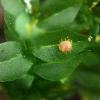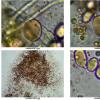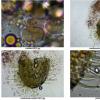
05-03-2015 00:40
Bonsoir à tous,De la part de Bernard Clesse, via

04-03-2015 21:28
 Zuzana Sochorová (Egertová)
Zuzana Sochorová (Egertová)
Hello,these fungi grew in a large group in a prima

05-03-2015 00:08
Bonjour à tous,Quelqu'un aurait-il ceci:Vegh, I.;

04-03-2015 19:07
Joaquin MartinHiI am looking for the monograph of Karschia, spec

04-03-2015 11:26
 Jenny Seawright
Jenny Seawright
Hello all, Sorry for poor images but I found this

03-03-2015 17:21
 Jenny Seawright
Jenny Seawright
Hello all, Would I be right in thinking that the i

02-03-2015 19:47
 Zuzana Sochorová (Egertová)
Zuzana Sochorová (Egertová)
Hello,these fungi grew on a naked soil with low mo

26-02-2015 10:01
This gathering is 15 days, in mixed forest floor Q

02-03-2015 22:53
Hola. Os presento esta posible Urceolella en rama
De la part de Bernard Clesse, via le forum Meli-Melo:
Sur feuilles de Tetraphis pellucida (mousse sur bois très pourri) en milieu tourbeux.
J'ai d'abord cru à un Octosporella (tout à fait son look et son écologie) mais la micro ne va pas et je me rappelle en avoir envoyé des tout à fait similaires et avec la même micro au moins à deux reprises l'année passée sur le forum et personne n'avait eu d'idée.
a) conidiomes : diamètre 140-190 mu
b) conidies brunes, lisses, la plupart ellipsoïdes à ovales ou subglobuleuses, plusieurs cependant polymorphes (comme des cailloux), de tailles très variables : 6-14x5,5-10,5
c) poils à base renforcée, à contenu paraissant jaunâtre (ou simple réfringence ?), 62-85x5
Merci d'avance pour lui - LUC.
Salut Luc
Je vais peut-être dire une bêtise : s'agit-il d'un champignon ?
Je trouve souvent des ovnis rouges identiques que j'apparente à des oeufs, cocons ou autre farce-et-attrape.
Alain
Je regarde dans une autre voie.
Amitiés - LUC.

I agree with Alain, there seems to be no damage to the moss leaf, which begs the question if it is a fungus what is it feeding on?
Cordialment
Chris




 micro-BC--0001.jpg
micro-BC--0001.jpg